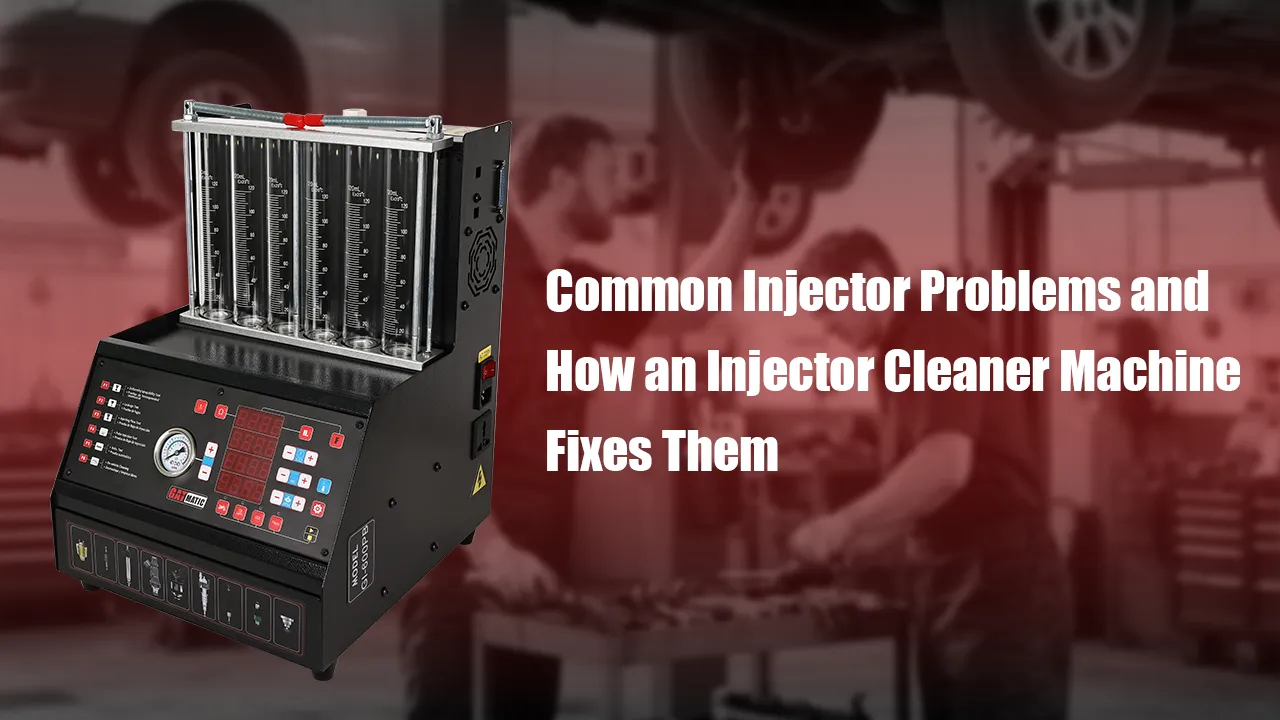Recent Blog
Common Injector Problems and How an Injector Cleaner Machine Fixes Them
Introduction:
Modern engines rely heavily on precise fuel delivery and efficient combustion, which means even minor injector issues can negatively impact vehicle performance. For workshops and automotive service providers, understanding common injector problems and knowing how to address them effectively is essential. This is where an injector cleaner machine plays a critical role.
In this article, we explore the most frequent injector problems found in today’s vehicles and explain how a professional injector cleaner machine restores injector performance, improves fuel economy, and reduces customer complaints.
Understanding Common Fuel Injector Problems
Fuel injectors operate in harsh environments, making them susceptible to carbon buildup, clogging, and component wear. Below are the issues workshops encounter most frequently.
1. Clogged or Restricted Injectors
Over time, fuel injectors accumulate carbon deposits, varnish, and impurities from low-quality fuel. These deposits restrict the spray pattern and reduce fuel flow. Drivers may experience rough idling, reduced power, misfires, or poor acceleration.
2. Uneven or Poor Atomization
A healthy injector must atomize fuel into a fine mist. When deposits form around the nozzles, the spray pattern becomes uneven. This results in incomplete combustion, higher emissions, and increased fuel consumption.
3. Injector Leakage
Internal or external injector leaks can cause hard starting, excessive fuel smell, or high fuel trim values. Leaking injectors also increase the risk of catalytic converter damage.
4. Electrical or Mechanical Failure
Coils, pintle valves, and seals may malfunction due to age or corrosion. While some failures require component replacement, many performance-related issues can be corrected through professional cleaning and testing.
Why Workshops Need a Professional Injector Cleaner Machine
Injector problems cannot be solved with simple fuel additives alone. A workshop-grade injector cleaner machine provides precise cleaning, testing, and performance restoration for both gasoline and GDI injectors. Here is what makes it indispensable for modern garages.
1. Deep Ultrasonic Cleaning for Deposit Removal
An injector cleaner machine uses high-frequency ultrasonic waves to remove carbon, varnish, and gum from internal and external injector surfaces. Unlike chemical additives, ultrasonic cleaning delivers complete and thorough results.
2. Accurate Flow and Spray Pattern Testing
These machines simulate real engine conditions to evaluate injector flow rates, spray angles, and atomization quality. By comparing test results, technicians can identify weak or clogged injectors with high accuracy.
3. Timely Detection of Leakage and Dripping Issues
Leak tests reveal whether an injector fails to close properly or has worn sealing components. Early detection prevents fuel wastage and avoids damage to engine and exhaust systems.
4. Restoring Balanced Fuel Delivery
After cleaning and calibration, injectors deliver consistent fuel volumes across all cylinders. This improves engine smoothness, reduces emissions, and enhances overall performance.
How an Injector Cleaner Machine Fixes Injector Problems
A high-quality injector cleaner machine combines cleaning, testing, and calibration into one complete service process. Below is the step-by-step workflow typically used in professional workshops.
1. Removal and Initial Inspection
The technician removes the injectors and checks for physical damage, cracks, or corrosion before beginning the service.
2. Ultrasonic Cleaning
Injectors are placed in an ultrasonic tank filled with cleaning solution. The machine generates micro-bubbles that collapse against the injector surfaces, breaking down stubborn carbon deposits.
3. Automated Testing
The injectors undergo a series of tests including flow measurement, spray pattern analysis, leak testing, and pulse tests. The machine shows clear comparisons to factory specifications.
4. Reverse Flushing
Reverse cleaning pushes cleaning solution backward through the injector to clear internal blockage and restore proper flow.
5. Final Calibration and Re-Testing
After cleaning, injectors are re-tested to confirm balanced flow and ideal atomization before reinstallation.
This comprehensive process ensures precision, reliability, and measured results that outperform any manual or chemical-only cleaning method.
Benefits of Using an Injector Cleaner Machine in Your Workshop
Adopting a professional injector cleaner machine brings long-term value to both workshops and customers.
- Improves fuel efficiency and power delivery
- Reduces engine misfires and idle instability
- Minimizes emissions and environmental impact
- Enhances customer satisfaction through measurable improvements
- Increases workshop revenue with a high-demand service offering
In the modern automotive maintenance industry, injector service is no longer optional but a standard requirement for maintaining engine efficiency and compliance with emissions standards.
FAQs About Injector Cleaner Machines
Q: Does an injector cleaner machine work on GDI injectors?
A: Yes. Most modern injector cleaner machines support both port fuel injectors and gasoline direct injection injectors, providing ultrasonic cleaning and high-pressure testing.
Q: How often should injectors be cleaned using a machine?
A: Most workshops recommend cleaning every 30,000 to 50,000 kilometers, depending on fuel quality and driving conditions.
Q: Can an injector cleaner machine fix a completely damaged injector?
A: No. Mechanical or electrical failures require injector replacement. The machine restores performance only when issues are related to clogging, deposits, or minor internal sticking.
Q: Is machine cleaning better than fuel additives?
A: Yes. Fuel additives provide mild cleaning but cannot remove heavy deposits or restore spray patterns. A professional injector cleaner machine offers deep ultrasonic cleaning and accurate testing.
Q: What are the main features to look for in an injector cleaner machine?
A: A good machine should offer ultrasonic cleaning, flow testing, leak detection, reverse cleaning, high-pressure testing for GDI injectors, and clear digital reporting.
Describe Your Needs In Detail!
We will carefully evaluate your needs and give professional solutions.



